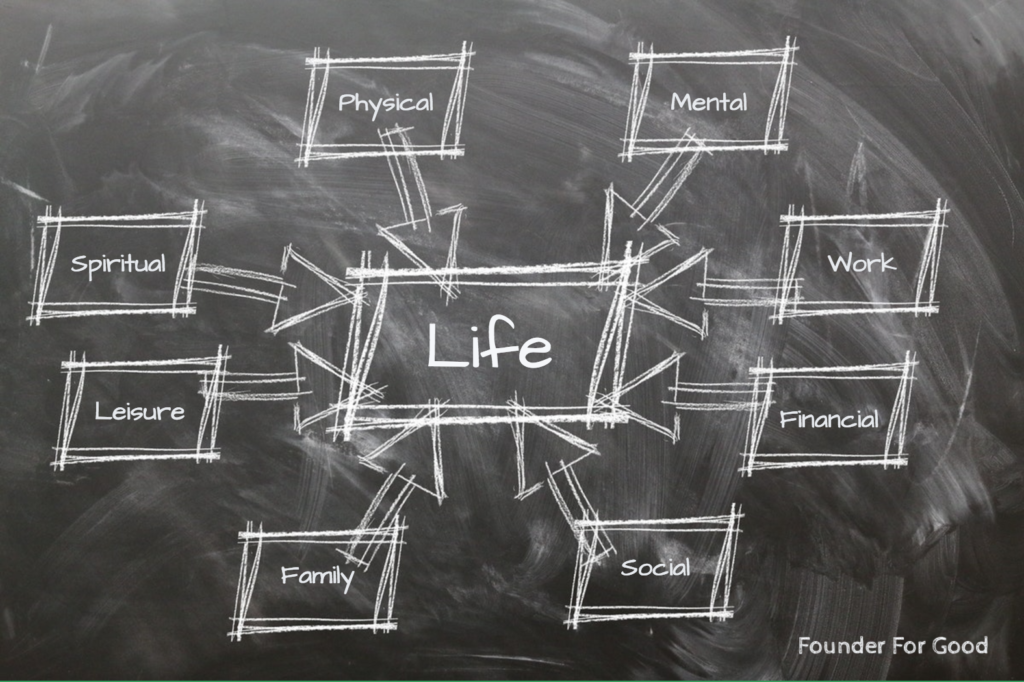Every person has a blend of strengths and weaknesses unique to themselves. Oftentimes, I’ve experienced that when we tend to favor certain aspects of life over others, the results we receive are not well balanced at all, and can, in fact, be harmful.
As I’ve considered these truths at work in my life, I’ve discovered the importance of finding a healthy life balance. In general, I’ve observed there to be 8 parts of a balanced and meaningful life, and my desire on this blogging journey is to strengthen my own life and share my discoveries in the following areas:
- Physical
- Mental
- Work
- Financial
- Family
- Social
- Leisure
- Spiritual
Physical
A healthy physical life is a foundation that enables us to do well in the other aspects of life. It has an impact on not only the length of life but also the quality of life, to a general degree. In this model, physical life consists primarily of diet, exercise, and sleep.
Diet, exercise, and sleep should be viewed as fuel in a car. Just as fuel enables a car to run, a healthy diet, proper sleep, and consistent exercise enable us to excel in the other aspects of our life. With a good balance of fuel, we can go far. Exercise is not only fuel but also can be utilized in upgrading the body to be stronger and more efficient.
Our physical lives should be consistent. A car cannot continue driving for years after one tank of gas but must be refueled consistently when the gas gets low. It’s the same for our physical lives. For example, going on one short-term diet, exercising for one week, or getting one good night of sleep will not last into the future indefinitely. We must consistently maintain our physical life for optimal success in this area.
Mental
Mental life encompasses what we know and how we see the world. Knowledge and understanding are compounding; the more you learn, the more prepared you become to learn more.
I believe the way to excel in this area is by adopting a continuous learning lifestyle. Some confine the learning phase to the first 18-24 years of life. Instead, our mental and intellectual growth should be viewed as a continuous part of our whole life.
Some ways to continuously grow our mental lives are to read, interact with other views and ask questions, listen to podcasts, attend conferences pertaining to a certain niche.
My current favorite tools in this area are:
Work
Work is a vital part of our lives, providing a major identity label declaring “This is what I do.” It gives us a sense of accomplishment and the opportunity to make the world a better place for ourselves and others.

For some work is simply a means to bolster their financial life, for others, it is what accomplishes their purpose or mission, regardless of monetary compensation. For most people, work is a mix of both financial gain and accomplishing a personal passion.
When asked the question “what do you do?” we typically respond by sharing how we spend the bulk of our time and energy.
When it comes to the balance of life, I’ve observed that many people tend to choose a work-heavy schedule for a condensed period of time. For instance, investing all time & energy into work post-college in hopes of an early retirement, when they’ll finally be able to focus on leisure, family etc. I’m going to challenge the view that work is a season and consider the results of viewing work as a consistent, balanced part of a whole lifespan.
Financial
No matter how much money we make whether it’s minimum wage or a 7-figure income, we all have financial lives and a responsibility to manage our money wisely. Finances can create a strain or create opportunities within the other aspects of life, depending on how we handle what we have. Living within our means, using finances for the good of others (family, friends, community, etc.) and even increasing our own assets are responsible ways to manage money.
In this area of life, I want to explore the ideas of budgeting, saving, reducing/completely removing debt, and informed investing. I am incredibly interested in the concept of return on investment for financial transactions made and even the time we have. Questions like, “Is this purchase worth it?” help guide wise decision making for a wide variety of situations.
It may be financially savvy for you to take a 15 minute trip to grandmother’s house in the next town over, to bring her a basket of cookies. For me, to take a basket of cookies to grandmother’s house would mean buying a plane ticket, renting a car and spending 3 days to drop off a basket of cookies. Instead, I can package them and send them by mail. However, if my grandmother is turning 100 and I find it important to visit her on such a special occasion, purchasing the plane tickets & car rental and bringing cookies along with myself definitely becomes worth the investment.
This short story to say that, financial decisions are deeply personal and diverse among different people. What may be of value for me, may be worthless to you and vice versa. Even the idea that time changes the value of a certain item (in this case, my grandmother’s special birthday) is extremely interesting. Throughout my journey, I will explore and share the systems, perspectives and even products I find that increase the health and value of my financial life.
Family
The family is often the very best or very worst part of a person’s life. I think this is because family is the most intimate part of the social structure and we are most vulnerable with family, leaving ourselves open to both encouragement and wounding.

Our families influence who we are and who we are becoming. We are not isolated from one another. What one does, affects the whole.
Family life should be a safe haven and launching pad into the other areas of life. What we experience within the family will have a direct influence on how we think about and interact with the physical, mental, work, financial, social, leisure and spiritual parts of life.
A healthy family life has lasting positive impacts, while an unhealthy family life has lasting negative impacts. Positive impacts can be ignored and negative impacts can be overcome, but there is no denying that family has a powerful influence.
My hope is to understand the various roles within the family and discover how to interact with one another in a meaningful way. These include achieving a healthy marriage and healthy relationships with parents, in-laws, kids etc. I’ll be exploring the connections and relationships between family members, discovering for myself how to be the best husband, son, brother, uncle, and hopefully someday father.
What if I don’t experience trust, support, and honesty within my family? Having a healthy family life starts with me (or you!). I don’t have to wait for my everyone else in my family to get their acts together. I can step up by living out these principles and usher in a more balanced and meaningful family life.
Social
Humans are social beings made to know and be known by others. Our social lives very clearly interact with the other points of this model – obviously family, but also leisure, spiritual, work, physical.
We are not meant to live life alone, but rather within a community. We should keep a close circle of friends to support and challenge us (and we do the same for them). Interacting with others outside our close circle will help us grow by offering new insight, wisdom, and perspective on the other areas of life. It is also important for us to be able to limit or remove toxic relationships that cause destruction instead of growth.
I want to explore the topics of social etiquette, overcoming fear of rejection in developing new relationships, how to be a good friend, how to find a mentor and learn from them, how to interact with colleagues, how to use social media to cultivate a healthy social life and how to manage relationships for growth.
Leisure
What do I enjoy doing? It is important to have moments in the day where we do things we want to do. I would recommend doing something that enhances other parts of life.
Take, for instance, these hobbies: Reading can improve mental life. Playing a game or sport can be physical and social in nature. Traveling with family and friends can enhance those areas as well. Ideally, we should pick hobbies that will improve the other aspects of life.
For me, I love to travel and explore new places with my wife. One of our favorite ways to travel is by staying in an Airbnb, it allows us to have a small home to ourselves while feeling a bit like a local. I also enjoy golfing with friends, listening to podcasts and taking walks with my wife in my free time.
Recommended Tools – Airbnb
Spiritual
Spiritual life is the foundation for the “whys” behind our actions and beliefs. The answers to “Why am I passionate about my line of work?”, “why do I find value in certain things and not others?” “why is it important to take care of my physical body?”, “why does it matter how I spend my time?”, and even bigger questions like “what is the purpose of my life?”, “who am I?”, “why do I exist?” come from what we believe about ourselves and God.
I’ll be documenting my experiences, fundamental truths I’ve learned, and sharing resources that have been helpful for me in the formation of my spiritual life.
I am well aware that more than any other category, some readers will disagree with this section, and it’s okay to disagree. Hopefully, we can all learn and grow from interacting with each other over this important aspect of life.
For me, my relationship with God is not simply a sidebar, but where I find practical and real answers to all of life. It is my experience that when I trust any other part of this model to give meaning and purpose to life, it will let me down.
If I put my trust in:
- Physical – disease, injury and death can let me down.
- Mental – a life of intellectual pursuit without a grander purpose leaves me empty.
- Work – I might lose my job or my ability to do my job, and my world would fall apart.
- Financial – I can be let down stock market crashing, corrupt financial partners or a poor financial move.
- Family – divorce, death, and being wounded by a loved one could destroy me.
- Social – I can be rejected by friends, ignored or ostracized in my circles.
- Leisure – I can lose the ability to continue a hobby that I love.
Only an unchanging, faithful and good God can bear the weight of my trust. He will not fail or go back on his promises.
Please note: Some of the links on this page are affiliate links – meaning that if you signup and begin using the product, Founder For Good will receive a small commission at no additional cost to you. I am a paying user of many of these products and only recommend products I truly believe will be helpful for my readers.
Thank you for reading, let me know what you think!
What part of life is your greatest strength? greatest weakness?
Are there parts of life that don’t quite fit into any of these categories?


Very well written. I look forward to reading more!
I believe I have been lacking in the leisure. I’m going to need to work on that and will be sure it involves all the other aspects of a balanced life. 🙂
Thank you! I appreciate the kind words.
Love this. Thanks for sharing this Joseph. It is important to have a great balance in life. Living in a world that focuses on the physical it is great that we have people to remind us of the importance of the spiritual and the need to maintain a healthy relationship with God for human flourishing.
Thank you, Hafeez, you’re exactly right!
My hope is that this blog can be a consistent reminder that this balance is key to a healthy life, complete with meaning and joy.